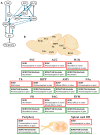BDNF Signaling and Pain Modulation
- PMID: 40214430
- PMCID: PMC11987912
- DOI: 10.3390/cells14070476
BDNF Signaling and Pain Modulation
Abstract
Brain-derived neurotrophic factor (BDNF) is an important neuromodulator of nervous system functions and plays a key role in neuronal growth and survival, neurotransmission, and synaptic plasticity. The effects of BDNF are mainly mediated by the activation of tropomyosin receptor kinase B (TrkB), expressed in both the peripheral and central nervous system. BDNF has been implicated in several neuropsychiatric conditions such as schizophrenia and anxio-depressive disorders, as well as in pain states. This review summarizes the evidence for a critical role of BDNF throughout the pain system and describes contrasting findings of its pro- and anti-nociceptive effects. Different cellular sources of BDNF, its influence on neuroimmune signaling in pain conditions, and its effects in different cell types and regions are described. These and endogenous BDNF levels, downstream signaling mechanisms, route of administration, and approaches to manipulate BDNF functions could explain the bidirectional effects in pain plasticity and pain modulation. Finally, current knowledge gaps concerning BDNF signaling in pain are discussed, including sex- and pathway-specific differences.
Keywords: BDNF; TrkB; neuroimmune signaling; neuroplasticity; pain.
Conflict of interest statement
The authors declare no conflicts of interest.
Figures

References
Publication types
MeSH terms
Substances
Grants and funding
LinkOut - more resources
Full Text Sources
Medical

